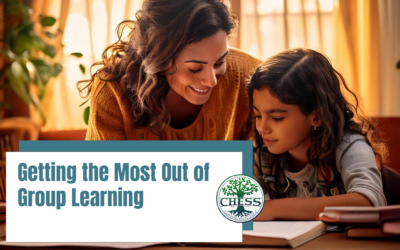As a young 20-year-old in college learning my future craft of teaching, I was told to balance compassion for the student with not enabling them to fall below standard. Sadly, the “standard” in most public schools is often far below a homeschooling family’s standard. For instance in public schools, families, and therefore children, have had more than their share of trials and tribulations at home, and in a classroom of 25+ students a teacher can’t really get a handle on specific needs a student has. On the plus side, if a teacher suspects a learning disability (LD) or other problem in that environment, there are a slew of ways to start the process of evaluation to get needed academic help. That, however, invites the risk of having children exposed to emotional disturbed children who are often in the same environment as children who have learning disabilities, or forever deemed to feel they are in the “slow” group.
As a veteran homeschooling parent of over 20 years, I gained more of a reality check. I had three children who would have qualified for learning disability help. We learned a lot during those years. Here in a nutshell were some of the life lessons we learned:
It’s important to LISTEN to others! Co-op teachers, other moms, friends…they all see things in your child you might not see, or want to see. A child who has learning / processing / communication / reading difficulties wants to succeed at the same level as his friends. Sometimes it’s possible…sometimes it’s not. I’ve had many students over the years who I have suspected have had learning difficulties. After much observation of the student and his abilities, I tread carefully divulging my suspicions to the parent. Reactions vary from “Yup, I wondered about that” to “No way! Not my child…it’s just his age / hormones / laziness”. I WAS that parent, as I explain below. Thinking your child is just lazy is one of the most damaging things to do to you and your child’s relationship.
Professional insight CAN be helpful. Getting a diagnosis can often make the difference between sanity and despair (yours AND your child’s). My daughter couldn’t read simple, one-vowel words at nine years old. All her brothers were reading chapter books at ten. After struggling just getting her to remember small short vowel words for longer than 30 seconds, I was at my wits end. I went to an Educational Psychologist who was homeschooler friendly and voilà! I found out that she wasn’t being lazy and obstinate, and I wasn’t crazy. He put her on meds (YES, meds!), and told me homeschooling was the best avenue for her, and after an attitude adjustment on my part, she was reading on grade level within 6 months. Learning RX, ADHD / anxiety meds, tutoring- they can be helpful tools and are not taboos.
Slow down the academics. If a student has learning problems (severe spelling issues, disorganization, ADHD, anxiety, and more), it is often better NOT to have them take a full course load, and to just graduate a year or two late. One of my children knows that taking a full load at college means disaster. We figured this out early, in high school, and he graduated a year behind his friends at age 19. Today, he’s a Phi Beta Cappa honor student who has graduated at age 28 from GMU, but took a max of three courses a semester so that he would not be overwhelmed. He has never stopped thanking me for our insight to slow him down in high school, and our patience with him now in college. His fragile feeling of being different and a failure is offset by his obvious accolades and accomplishments on his diploma and reports.
Give him an outlet. Let the student take courses / take electives / do sports he’s passionate about – even if doing so causes him to graduate late. EVERYONE needs an outlet. And kids who “fall short” in academics, need to shine somewhere else. The son mentioned above took 2 serious courses at NOVA his first year, along with weightlifting and ballroom dancing. He was one very joyful kid. His grades were amazing because he had an outlet and was happy.
Find teachers who are compassionate and extend grace and mercy to your child when necessary.My kids have had co-op (and private school) teachers who set hard and fast deadlines and never budged, didn’t have experience to motivate students “outside the box”, and couldn’t be flexible with that child’s needs. BUT then we had the teacher that allowed our techie son take chemistry and physics lab notes on his phone, and then print them out to turn them in instead of turning in a handwritten lab notebook. This was in 2005 – way before kids had their own phones – but he was a distractible techie kid who excelled in the science subjects but hated to write. Then there was the teacher who allowed us to find books on tape for our LD slow reading child instead of her having to physically read. At times, the teacher might need to “be tough”, so that the quality of that child’s education remains high, and so that your student learns reality lessons, but often she can make concessions to your situation. YOU are the homeschooling parent. Work with the teacher and come up with a plan on how to help your student succeed.
Spend money on life preservers. Put money away now for tutoring or other helps that might be necessary once you think your child might need it. Unless you have only one child to focus on, giving specific help in differing school subjects might be tough for you to do. And this might be the time to get someone else involved to take you out of possibly the “heavy” or “bad guy”.
PRAY, pray, pray! Call out to God for insight. G-E-T A-W-A-Y and spend time with your spouse alone for more than 2 nights (it takes at least 2 nights to get out of “mommy /teacher” mode. DO IT!) Find others who have similar kids and swap childcare. Then, love on your kids when you return. They are uniquely made and reflect the Father.
Mary O’Donnell has a degree in Education and Psychology. She is a happily married wife, thrilled mother of four adult children, and loves the other 2000 + kids she has joyfully taught over the years. She homeschooled her own children for over 20 years, and has been teaching all levels of honor French classes since 1998. Mary is a member of the American Association of Teachers of French. In 2015 she was honored to have been nominated for the NSHSS Claes Nobel Educator of Distinction.




0 Comments